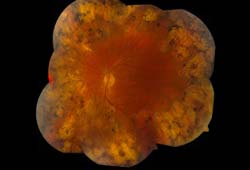Aetiology
Many inherited conditions can cause night blindness. The most common are retinitis pigmentosa and congenital stationary night blindness.[4]
Retinitis pigmentosa can be inherited as an autosomal dominant, autosomal recessive, or X-linked trait. Symptoms can be variable; some people develop symptoms in early childhood, while others may remain asymptomatic until adulthood. Disease severity depends on the underlying genetic abnormality and is often worse in X-linked and autosomal recessive cases.[3]
Congenital stationary night blindness is a heterogeneous group of disorders that present in childhood with complaints of night blindness, and, occasionally, other ocular symptoms (e.g., nystagmus, reduced visual acuity).
Acquired conditions leading to night blindness include vitamin A (retinol) deficiency, cancer-associated retinopathy, and melanoma-associated retinopathy.[4] Vitamin A (retinol) deficiency has a broad differential diagnosis, but prompt investigation and treatment can improve symptoms.[2] Note that, although rare, cancer and melanoma-associated retinopathy may cause visual symptoms before the underlying malignancy has been identified.[5][Figure caption and citation for the preceding image starts]: Retinitis pigmentosa as seen on fundoscopyProvided by Hugh Harris, Sunderland Eye Infirmary, UK; used with permission [Citation ends].
Pathophysiology
Night blindness has a complex pathophysiology that depends on the underlying disease process. Inherited gene mutations produce abnormal or absent proteins essential for photoreceptor function. Many gene mutations have been identified in both retinitis pigmentosa and congenital stationary night blindness.[6]
Vitamin A (retinol) is a fat-soluble vitamin that pancreatic enzymes break down for absorption in the proximal small intestine. Conditions that affect pancreatic function (e.g., cystic fibrosis, chronic pancreatitis), or conditions that reduce vitamin A (retinol) absorption (e.g., previous gastric surgery, Crohn's disease), may lead to deficiency.[2] Photoreceptors require vitamin A (retinol) to produce the essential proteins for the phototransduction cycle. Deficiency in these proteins can result in photoreceptor dysfunction and night blindness.
Use of this content is subject to our disclaimer